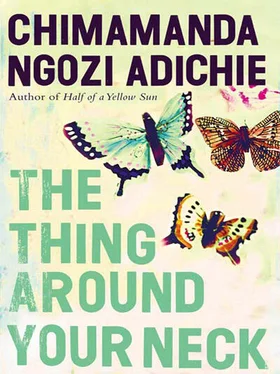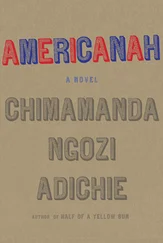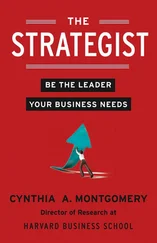But his parents were different; they almost made you think it was all normal. His mother told you that he had never brought a girl to meet them, except for his high school prom date, and he grinned stiffly and held your hand. The tablecloth shielded your clasped hands. He squeezed your hand and you squeezed back and wondered why he was so stiff, why his extra-virginolive-oil-colored eyes darkened as he spoke to his parents. His mother was delighted when she asked if you’d read Nawal el Saadawi and you said yes. His father asked how similar Indian food was to Nigerian food and teased you about paying when the check came. You looked at them and felt grateful that they did not examine you like an exotic trophy, an ivory tusk.
Afterwards, he told you about his issues with his parents, how they portioned out love like a birthday cake, how they would give him a bigger slice if only he’d agree to go to law school. You wanted to sympathize. But instead you were angry.
You were angrier when he told you he had refused to go up to Canada with them for a week or two, to their summer cottage in the Quebec countryside. They had even asked him to bring you. He showed you pictures of the cottage and you wondered why it was called a cottage because the buildings that big around your neighborhood back home were banks and churches. You dropped a glass and it shattered on the hardwood of his apartment floor and he asked what was wrong and you said nothing, although you thought a lot was wrong. Later, in the shower, you started to cry. You watched the water dilute your tears and you didn’t know why you were crying.
You wrote home finally. A short letter to your parents, slipped in between the crisp dollar bills, and you included your address. You got a reply only days later, by courier. Your mother wrote the letter herself; you knew from the spidery penmanship, from the misspelled words.
Your father was dead; he had slumped over the steering wheel of his company car. Five months now, she wrote. They had used some of the money you sent to give him a good funeral: They killed a goat for the guests and buried him in a good coffin. You curled up in bed, pressed your knees to your chest, and tried to remember what you had been doing when your father died, what you had been doing for all the months when he was already dead. Perhaps your father died on the day your whole body had been covered in goosebumps, hard as uncooked rice, that you could not explain, Juan teasing you about taking over from the chef so that the heat in the kitchen would warm you up. Perhaps your father died on one of the days you took a drive to Mystic or watched a play in Manchester or had dinner at Chang’s.
He held you while you cried, smoothed your hair, and offered to buy your ticket, to go with you to see your family. You said no, you needed to go alone. He asked if you would come back and you reminded him that you had a green card and you would lose it if you did not come back in one year. He said you knew what he meant, would you come back, come back?
You turned away and said nothing, and when he drove you to the airport, you hugged him tight for a long, long moment, and then you let go.
She stood in line outside the American embassy in Lagos, staring straight ahead, barely moving, a blue plastic file of documents tucked under her arm. She was the forty-eighth person in the line of about two hundred that trailed from the closed gates of the American embassy all the way past the smaller, vine-encrusted gates of the Czech embassy. She did not notice the newspaper vendors who blew whistles and pushed The Guardian, Thenews, and The Vanguard in her face. Or the beggars who walked up and down holding out enamel plates. Or the ice-cream bicycles that honked. She did not fan herself with a magazine or swipe at the tiny fly hovering near her ear. When the man standing behind her tapped her on the back and asked, “Do you have change, abeg , two tens for twenty naira?” she stared at him for a while, to focus, to remember where she was, before she shook her head and said, “No.”
The air hung heavy with moist heat. It weighed on her head, made it even more difficult to keep her mind blank, which Dr. Balogun had said yesterday was what she would have to do. He had refused to give her any more tranquilizers because she needed to be alert for the visa interview. It was easy enough for him to say that, as though she knew how to go about keeping her mind blank, as though it was in her power, as though she invited those images of her son Ugonna’s small, plump body crumpling before her, the splash on his chest so red she wanted to scold him about playing with the palm oil in the kitchen. Not that he could even reach up to the shelf where she kept oils and spices, not that he could unscrew the cap on the plastic bottle of palm oil. He was only four years old.
The man behind her tapped her again. She jerked around and nearly screamed from the sharp pain that ran down her back. Twisted muscle, Dr. Balogun had said, his expression awed that she had sustained nothing more serious after jumping down from the balcony.
“See what that useless soldier is doing there,” the man behind her said.
She turned to look across the street, moving her neck slowly. A small crowd had gathered. A soldier was flogging a bespectacled man with a long whip that curled in the air before it landed on the man’s face, or his neck, she wasn’t sure because the man’s hands were raised as if to ward off the whip. She saw the man’s glasses slip off and fall. She saw the heel of the soldier’s boot squash the black frames, the tinted lenses.
“See how the people are pleading with the soldier,” the man behind her said. “Our people have become too used to pleading with soldiers.”
She said nothing. He was persistent with his friendliness, unlike the woman in front of her who had said earlier, “I have been talking to you and you just look at me like a moo-moo!” and now ignored her. Perhaps he was wondering why she did not share in the familiarity that had developed among the others in the line. Because they had all woken up early — those who had slept at all — to get to the American embassy before dawn; because they had all struggled for the visa line, dodging the soldiers’ swinging whips as they were herded back and forth before the line was finally formed; because they were all afraid that the American embassy might decide not to open its gates today, and they would have to do it all over again the day after tomorrow since the embassy did not open on Wednesdays, they had formed friendships. Buttoned-up men and women exchanged newspapers and denunciations of General Abacha’s government, while young people in jeans, bristling with savoir faire, shared tips on ways to answer questions for the American student visa.
“Look at his face, all that bleeding. The whip cut his face,” the man behind her said.
She did not look, because she knew the blood would be red, like fresh palm oil. Instead she looked up Eleke Crescent, a winding street of embassies with vast lawns, and at the crowds of people on the sides of the street. A breathing sidewalk. A market that sprung up during the American embassy hours and disappeared when the embassy closed. There was the chair-rental outfit where the stacks of white plastic chairs that cost one hundred naira per hour decreased fast. There were the wooden boards propped on cement blocks, colorfully displaying sweets and mangoes and oranges. There were the young people who cushioned cigarette-filled trays on their heads with rolls of cloth. There were the blind beggars led by children, singing blessings in English, Yoruba, pidgin, Igbo, Hausa when somebody put money in their plates. And there was, of course, the makeshift photo studio. A tall man standing beside a tripod, holding up a chalk-written sign that read EXCELLENT ONE-HOUR PHOTOS, CORRECT AMERICAN VISA SPECIfiCATIONS. She had had her passport photo taken there, sitting on a rickety stool, and she was not surprised that it came out grainy, with her face much lighter-skinned. But then, she had no choice, she couldn’t have taken the photo earlier.
Читать дальше











